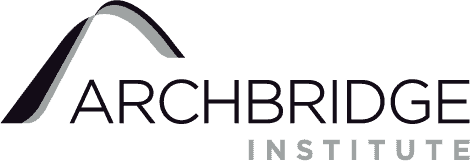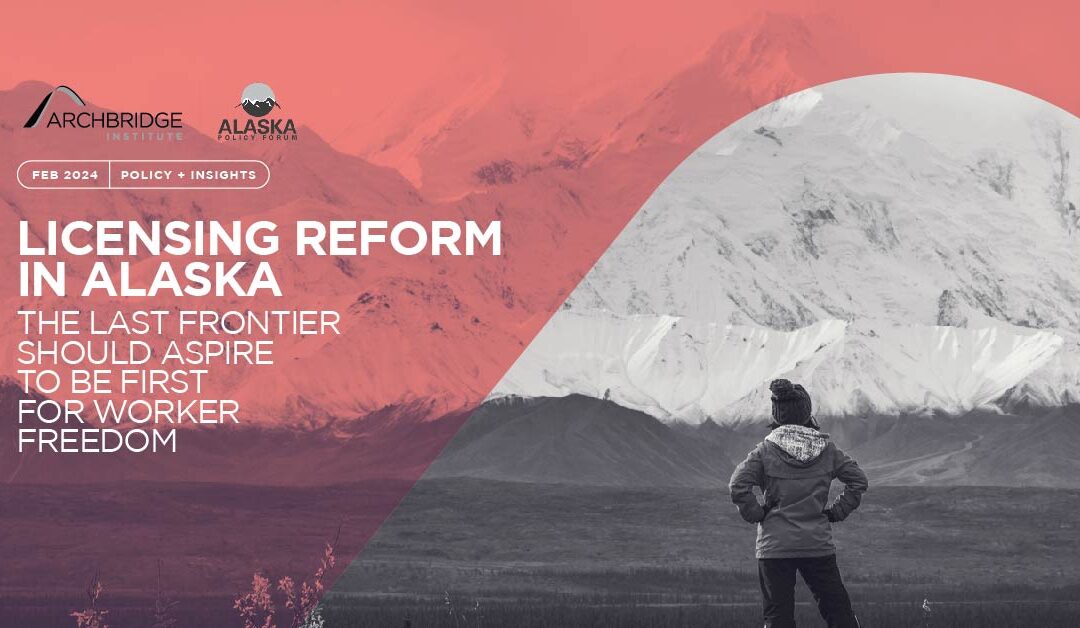Click here to open the PDF in a new Tab.
Why Does Occupational Licensing Matter in the Last Frontier?
As far as official barometers of Alaska’s labor market go, the state is near the national average. According to the Bureau of Labor Statistics, in December 2023 the unemployment rate in Alaska was 4.5 percent—well above the national average (3.7 percent).[1] The unemployment rate alone, however, doesn’t tell the whole story.
Several recent news reports are shedding light on the skilled labor shortage in Alaska.[2] The Anchorage Economic Development Corporation released its three-year outlook report this summer. From 2013 to 2023, the working-age population in Alaska fell from over 207,000 to 189,000—a reduction of nearly 10 percent.[3] Governor Dunleavy has recognized this problem and already taken action to eliminate the college degree requirement for most state jobs.[4] But more work remains to be done, and the action must come from state legislators this time.
Occupational licensing establishes laws that require aspiring workers to obtain a government permission slip to work. To obtain this permission slip, individuals must pass exams, pay fees to the government, complete minimum levels of education and training, and meet a variety of other entry requirements. By facing more barriers to work, individuals may have a harder time obtaining employment or be discouraged from participating in the job market altogether.[5]
Occupational licensing has grown from affecting about 1 in 20 workers in the 1950s to more than 1 in 5 (21.3 percent) in 2023.[6] Licensing results in wasted or misallocated resources and creates unnecessary barriers to employment and economic prosperity. A recent study estimates that more than 18 percent of workers in Alaska are licensed and that licensing nationally results in nearly 2 million lost jobs and costs $6 billion in economic activity per year.[7]
Proponents of occupational licensing claim that licensing improves the quality of service delivered to consumers or protects public safety. Although historically this may have been true, evidence from the present does not support this claim. [8] A comprehensive report performed by the Obama White House found little evidence that licensing enhances quality.[9] In fact, recent evidence using online reviews suggests that licensing may reduce the quality of services delivered to consumers.[10] In an online platform for consumers seeking residential home improvement and maintenance services, consumers seemed more interested in the prices and ratings of professionals than their licensing status.[11]
A Closer Look at Occupational Licensing in Alaska
In a previous study published by the Archbridge Institute, we documented how occupational licensing in Alaska grew more for low- and moderate-income workers than in several other states.[12] Between 1993 and 2012, Alaska added licensing requirements for 33 low- and moderate-income occupations—two more than the national average of 31. In contrast, Oklahoma, the state adding the lowest number of licenses over this period, added just 15 such licenses—18 fewer than Alaska. All of these added licenses resulted in fewer opportunities for workers and potentially worsened the current worker shortage.
In more recent work, we analyzed and ranked states by the number of occupations licensed.[13] Our analysis focused on 331 occupations—both low and high-income occupations. We ranked Alaska as having the 44th most burdensome licensing requirements (with 1st being the most burdensome). Alaska licenses 162 of the 331 occupations we studied. Although this is below the national average, it is 15 more occupations than Kansas licenses—the state we ranked as having the least burdensome occupational licensing nationally.
Several of the 162 occupations that Alaska licenses are not licensed in most states. Alaska licenses body piercing artists, while 33 other states do not. Alaska is also just one of 21 states that license opticians and one of 17 states to issue a separate license for pyrotechnic operators.
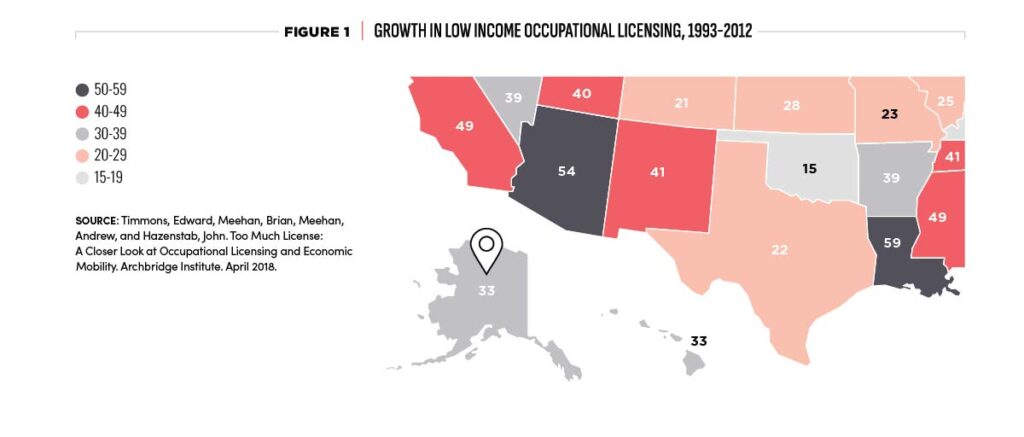
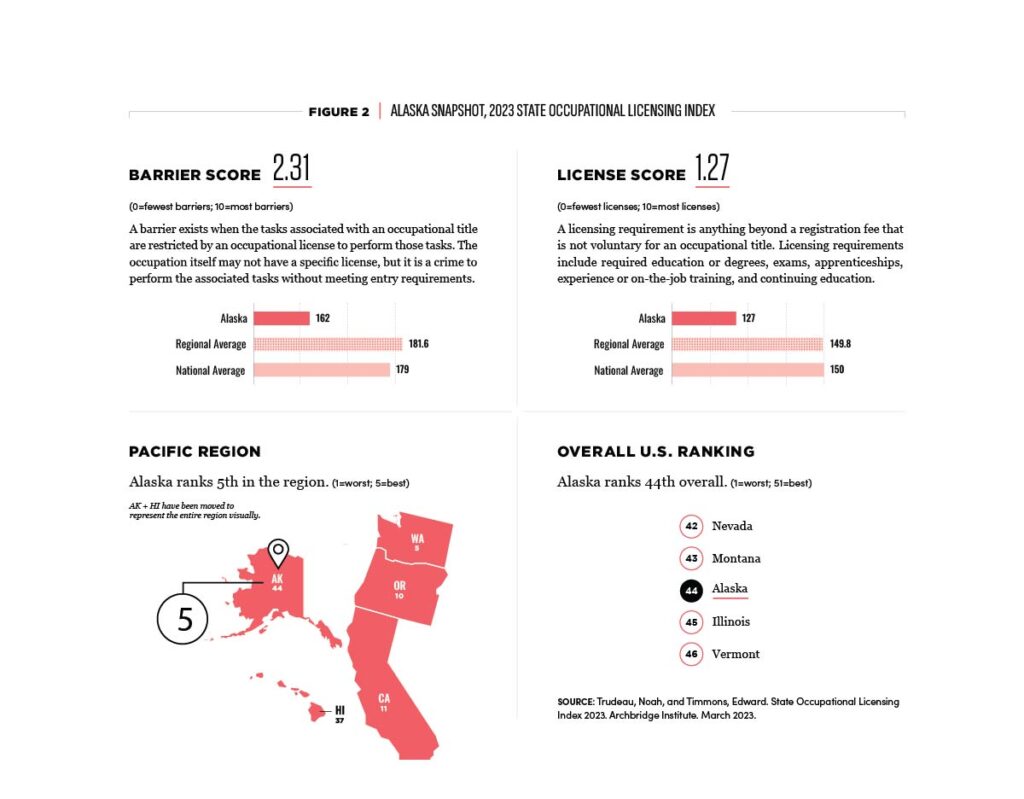

Moving Forward: Rolling Reviews, Universal Recognition, and Reducing the Burden of Occupational Licensing
In 2017, the state of Mississippi emerged as a national leader in occupational licensing reform after passing a sunrise review for new licensing legislation. This was expanded in 2020, giving the review committee greater authority to review existing licensing—a sunset review. The state of Nebraska moved forward with comprehensive reform two years ago with passage of the Occupational Board Reform Act.[14] The law subjects 20 percent of occupational regulations to annual review and sets forth guidelines to determine if occupational licensing is the appropriate form of regulation. Ohio passed a similar law in 2019,[15] and Utah created a new Office of Professional Licensure Review last year.[16]
This review is designed to ensure that licensing restrictions that are no longer necessary are removed, and overly burdensome restrictions are reduced to the appropriate level once the effects of the regulations can be measured. Under a rolling review, a portion of the bodies that oversee the licensure of an occupation must conduct a review to justify the existing regulations. The bodies that oversee licensing must release an annual report recommending eliminating, modifying, or maintaining licensing restrictions. The legislation contains language encouraging the least restrictive form of regulation that would help maintain consumer safety. Less restrictive alternatives to licensing include government certification, registration, bonding, private certification, and market competition.
Both consumers and professionals stand to benefit from this legislation. Reducing licensing requirements for occupations that pose a lower safety risk will increase competition, giving consumers more professionals to choose from and lowering prices. The legislation still maintains protection against potential harm to the consumer, but it does so by targeting regulation to the specific safety or quality issue. Meanwhile, professionals will benefit from the reduced barriers to entry for occupations that are now rarely licensed outside of Alaska. By matching the regulation to the risk posed by the industry, new entrants are saved from needless or irrelevant training which makes it more difficult to enter new fields or to move from other states.
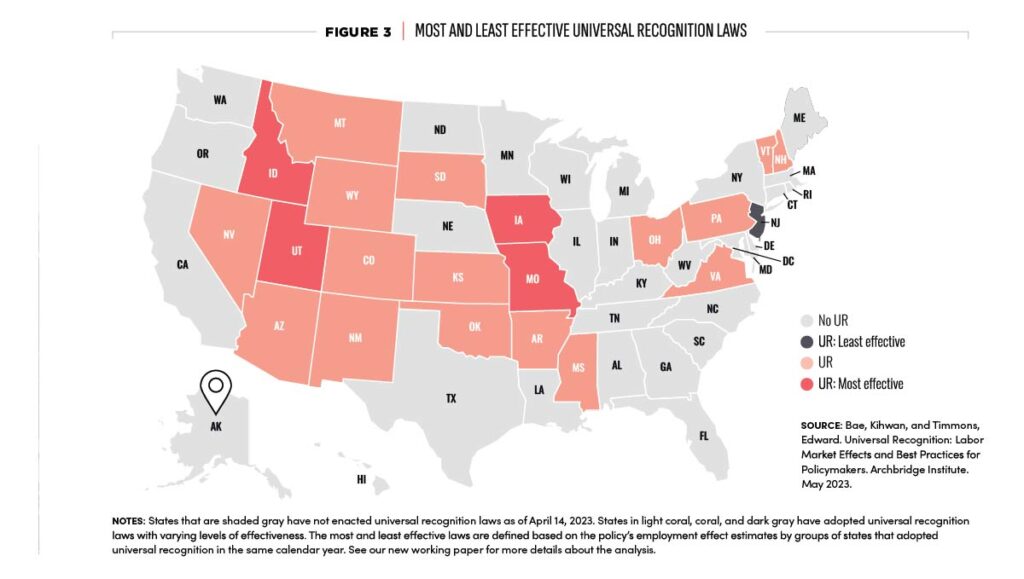
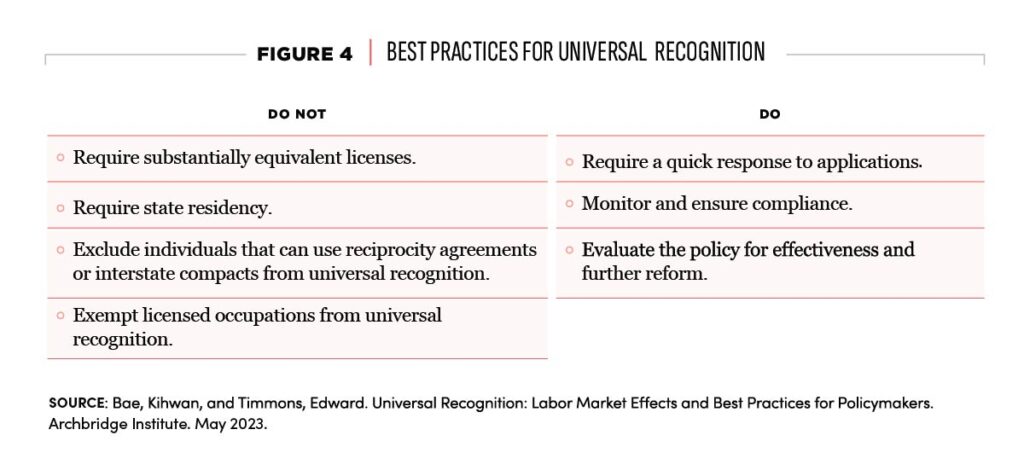
Another possible reform is universal recognition of out-of-state licenses. Since 2013, 21 states have adopted some form of this important policy.[17] The purpose of universal recognition laws is to reduce the barriers to geographic mobility caused by state-level licensing laws. States typically do not recognize licenses granted by another state, even when the requirements are the same or greater. Under universal recognition, licensed professionals moving between states are able to practice without going through the licensing process again. In effect, occupational licenses would act like driver’s licenses, being granted by one state but still legal to use in others. Professionals still must demonstrate their skills and abilities, but once they do, they are allowed to practice them wherever they move.
Universal recognition varies to some degree across the 21 states that have made the reform. Some states exclude certain occupations from the reform or require that licensees meet “substantially similar” requirements in their home state—regardless of how long they have been working. Other states require workers to be residents before they can take advantage of the reform. We recommend that for universal recognition to be fully effective, the reform must include as many licensed professions as possible without imposing residency or mandating that licensing requirements be “substantially similar.” Overall, our research finds that passage of universal recognition increases employment by nearly a full percentage point and conservatively has added 67,000 new jobs across the United States.[18]
Universal recognition is a simple reform that helps professionals moving into the state and the consumers who now have more professionals to choose from. It gives professionals the flexibility to relocate to a new state, encouraging interstate mobility. Workers can move to Alaska and begin practicing immediately, rather than wasting time and money retraining, reeducating, and retesting. Our research shows that universal recognition increased in-migration into states adopting the policy by 50 percent among those holding low-portability licenses. Existing residents that are out of the labor force or underemployed can also benefit. Universal recognition can allow these residents to take their valid out-of-state license, work experience, or private certification and use it toward obtaining a license in Alaska. It is important to note that the positive effects are found to be larger when universal recognition is not limited by additional requirements.
By accepting professionals who are already licensed and in good standing, proponents of licensing can still use the credential to discern the quality of the professional. Additionally, increasing the number of professionals will increase competition, helping to lower the prices that consumers pay for their services and increasing the convenience of service.
For too long, occupational licensing has been restricting opportunities for people in Alaska. Common sense reform should be implemented to improve the lives of Alaska’s citizens and help alleviate persistent worker shortages.
[1] https://www.bls.gov/web/laus/laumstrk.htm
[2] https://alaskabeacon.com/2023/08/03/workforce-shortages-could-sabotage-anchorage-and-alaska-economic-opportunities-report-says/; https://www.adn.com/business-economy/2023/08/08/amid-a-statewide-labor-shortage-alaska-builders-are-delaying-projects-and-pushing-work-outside/
[3] https://aedcweb.com/wp-content/uploads/2023/08/3-Year-Outlook-Report-Edited-8.16.23.pdf
[4] https://gov.alaska.gov/governor-dunleavy-champions-economic-opportunities-for-alaska-workers-orders-removal-of-four-year-degree-requirements-for-most-state-jobs/
[5] Peter Blair and Bobby Chung, (2019), How Much of Barrier to Entry is Occupational Licensing?. British Journal of Industrial Relations, 57: 919-943
[6] Kleiner, Morris. “Reforming Occupational Licensing Policies,” Hamilton Project, Brookings Institution, January 2015, http://www.hamiltonproject.org/papers/reforming_occupational_licensing_policies; Data on certifications and licenses, Bureau of Labor Statistics, January 2023, https://www.bls.gov/cps/cpsaat49.htm
[7] Kleiner, Morris and Evgeny Vorotnikov. “At What Cost,” Institute for Justice, November 2018, https://ij.org/report/at-what-cost
[8] D. Mark Anderson, Ryan Brown, Kerwin Kofi Charles, and Daniel I. Rees, (2020), Occupational Licensing and Maternal Health: Evidence from Early Midwifery Laws., Journal of Political Economy, 128(11): 4337-4383.
[9] Department of Treasury, Council of Economic Advisors, Department of Labor. “Occupational Licensing: A Framework for Policymakers,” Obama White House, July 2015, https://obamawhitehouse.archives.gov/sites/default/files/docs/licensing_report_final_nonembargo.pdf
[10]Darwyyn Deyo. “Testing Licensing and Consumer Satisfaction for Beauty Services in the United States,” Grease or Grit?: International Case Studies of Occupational Licensing and Its Effects on Efficiency and Quality (2022): 123-142.
[11] Farronato, Chiara, Andrey Fradkin, Bradley Larsen, and Erik Brynjolfsson. “Consumer Protection in an Online World: An Analysis of Occupational Licensing,” NBER Working Paper No. 26601, January 2020.
[12]Timmons, Edward, Brian Meehan, Andrew Meehan, and John Hazenstab. “Too Much License: A Closer Look at Occupational Licensing and Economic Mobility,” Archbridge Institute, April 2018, https://www.archbridgeinstitute.org/too-much-license/
[13] Noah Trudeau and Edward Timmons. State Occupational Licensing Index 2023. Archbridge Institute, https://www.archbridgeinstitute.org/state-occupational-licensing-index-2023/, March 20, 2023.
[14] https://nebraskalegislature.gov/FloorDocs/105/PDF/Slip/LB299.pdf
[15] https://www.forbes.com/sites/nicksibilla/2019/01/09/new-ohio-law-takes-aim-at-occupational-licenses-which-cost-state-6-billion/
[16] https://www.forbes.com/sites/nicksibilla/2022/03/28/utah-passes-new-law-to-prevent-new-occupational-licenses/?sh=292b255a4263
[17] Kihwan Bae and Edward Timmons. Universal Recognition: Labor Market Effects and Best Practices for Policymakers. Archbridge Institute, https://www.archbridgeinstitute.org/universal-recognition-best-practices/ May 23, 2023.
[18] Kihwan Bae and Edward Timmons. Ibid.
